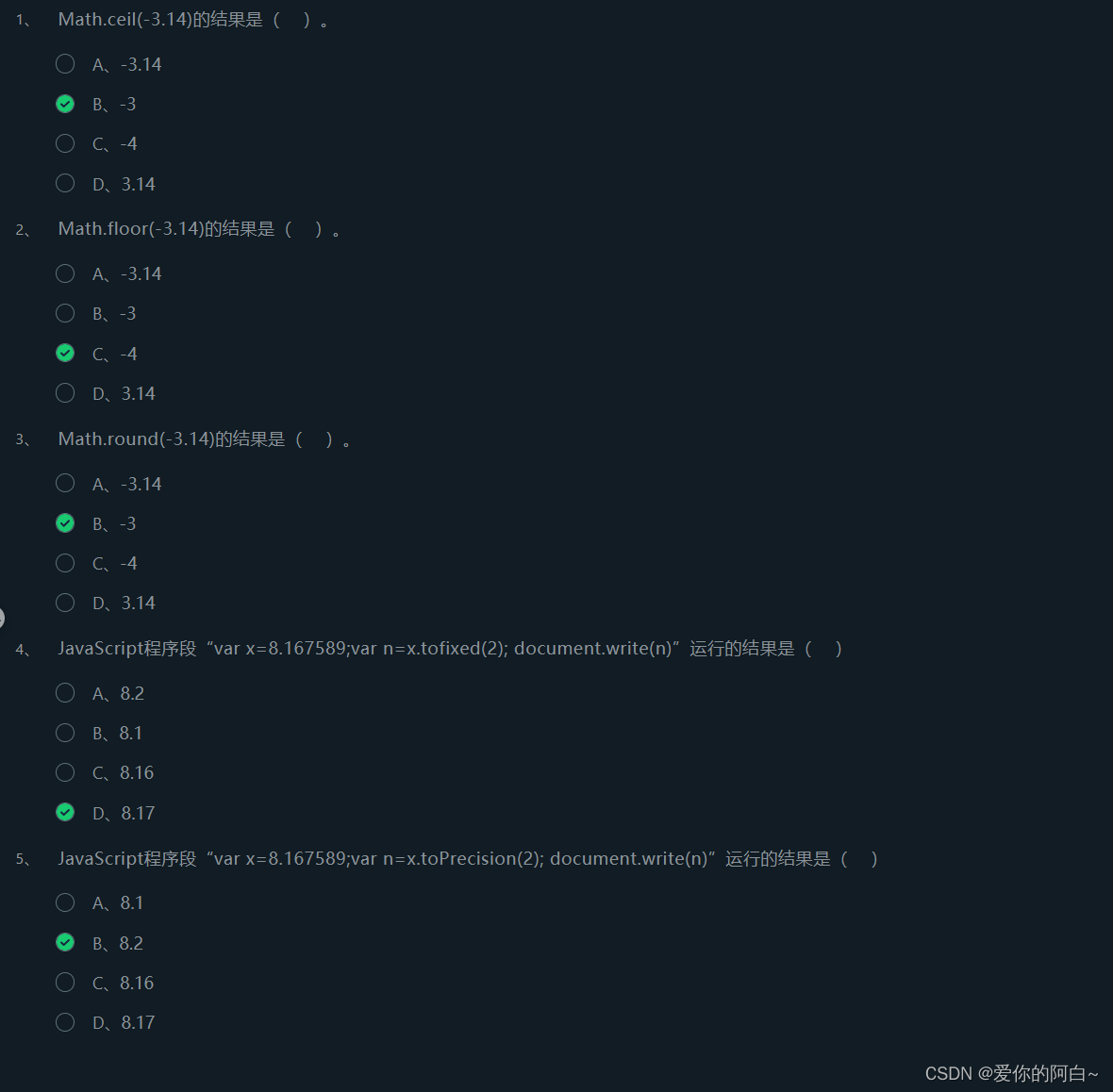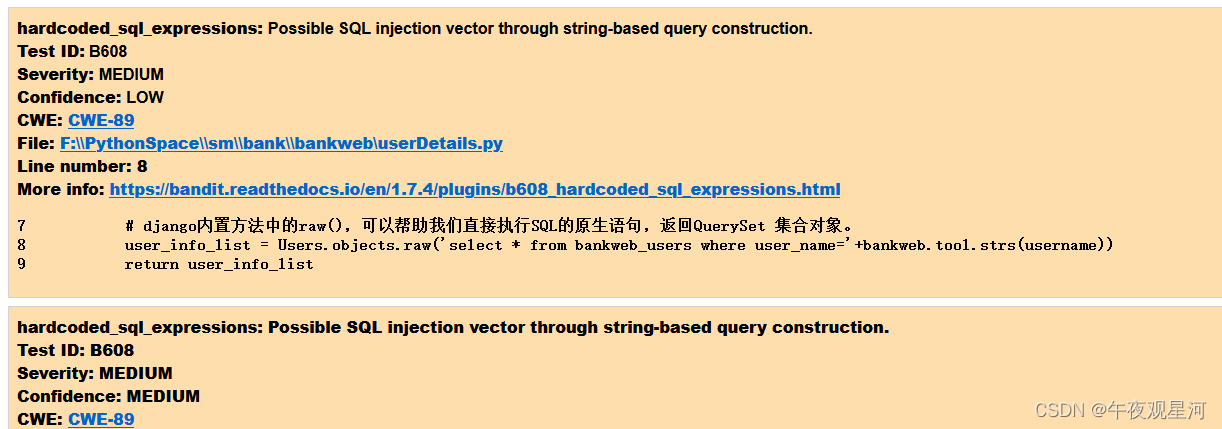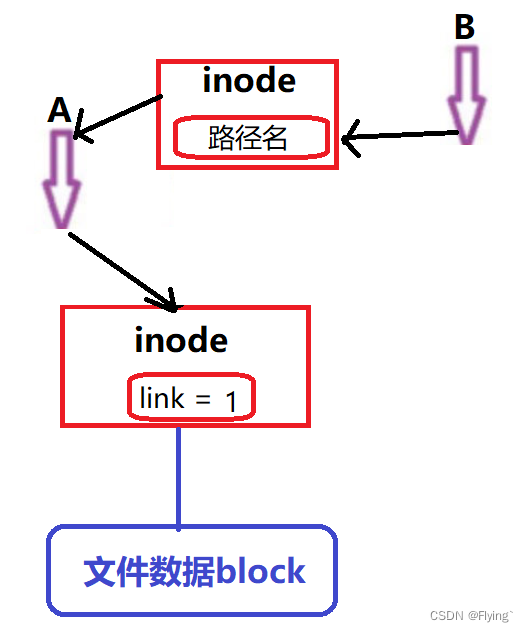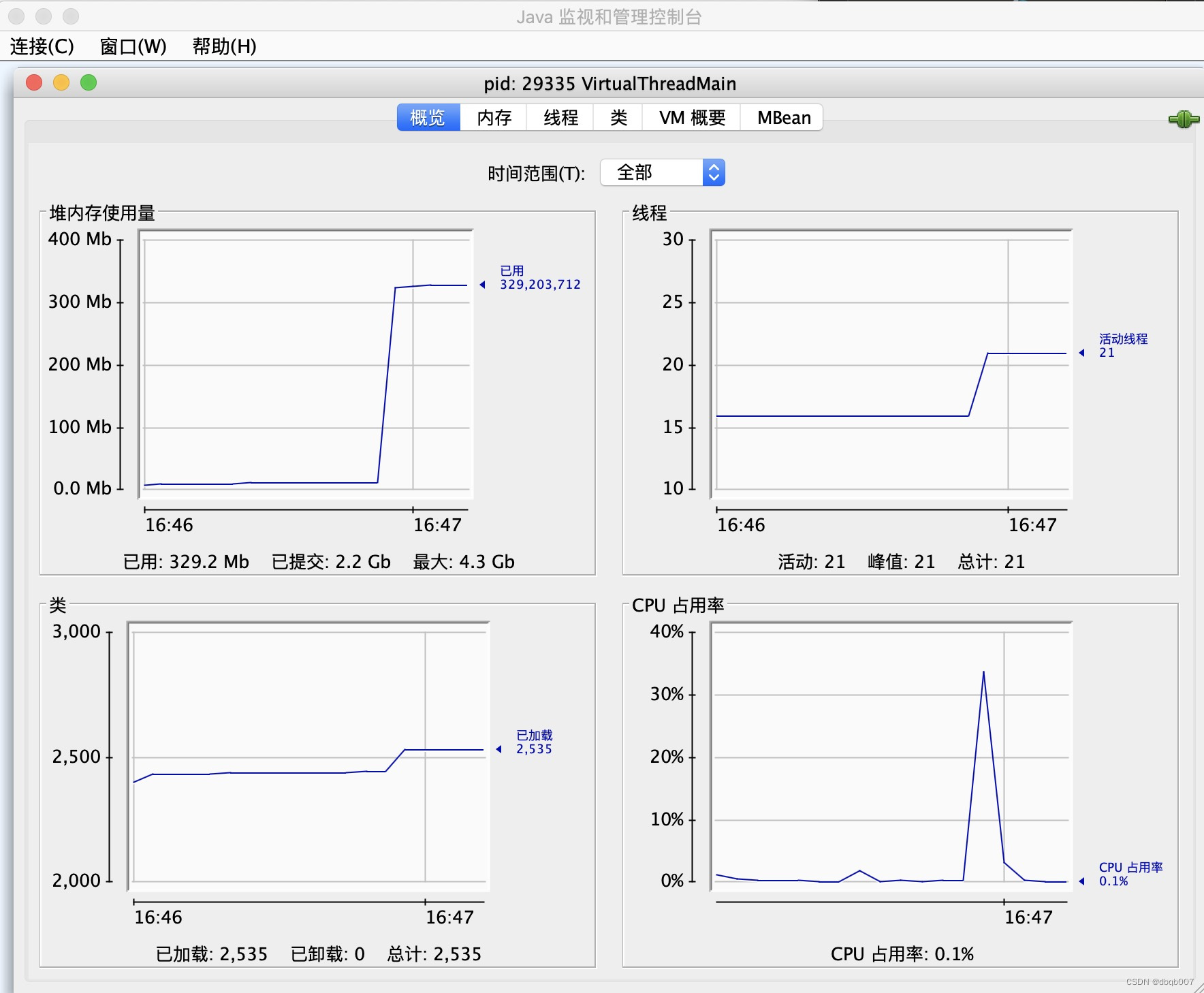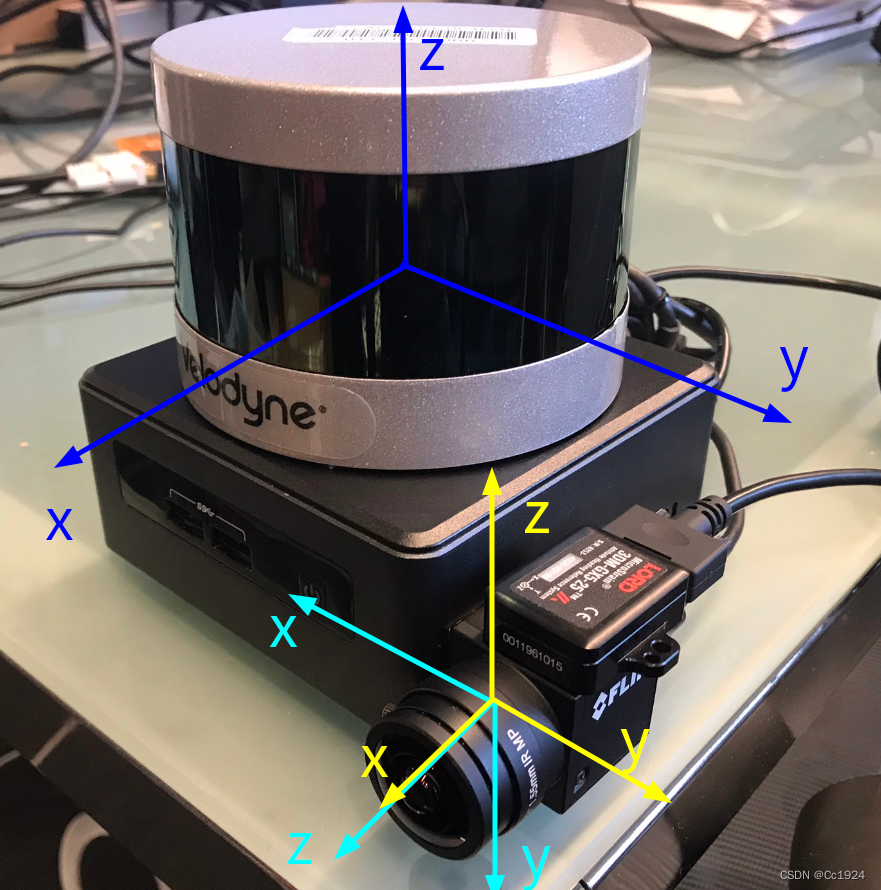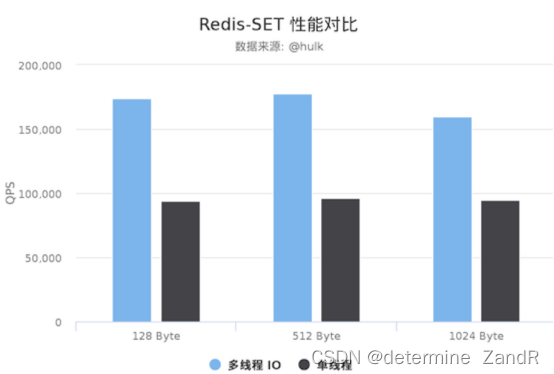1.简介
使用OpenSSL生成公私钥文件,然后再将文件中的信息读出的操作。
由于要对设备升级,需要用到RSA算法对一部分验证信息进行加密.
2.使用OpenSSL获取公私钥
我在window系统尝试安装OpenSSL,但是安装不上,我们可以使用linux自带的OpenSSL自动生成公私钥(我这里使用的Ubuntu)
打开终端,依次输入一下命令就可以生成我们想要的文件(生成文本文件,是为了便于查看文件内容;生成bin文件是为了接下来的文件操作)
//生成1024位的私钥
openssl genrsa -out private.pem 1024
//将生成的文件转换为文本
openssl rsa -in private.pem -text -out private.txt
//将BASE64编码的文件转换为bin文件
openssl base64 -d -in private.pem -out private.bin详细关于私钥(PEM格式)参考:OPENSSL中RSA私钥文件(PEM格式)解析【一】 - 走看看
3.文件处理
3.1秘钥信息获取
通过查看生成的文本文件发现,不同的文件生成的文件长度不一样,有些会在头部自动添加一个“00”

为了解决不同文件的差异,消除“00”的影响,文件处理流程如下:

上面的步骤还有uint32_t bits的位还没有设定,由于我们生成的1024bit的秘钥,所以我们将bits的值设为1024.如下所示的结构体,就是RSA私钥断开
//上面的流程主要是将生成的秘钥按格式填入
typedef struct
{
uint32_t bits; /* length in bits of modulus */
uint8_t modulus[256]; /* modulus */
uint8_t publicExponent[4]; /* public exponent */
uint8_t exponent[256]; /* private exponent */
uint8_t prime[2][128]; /* prime factors */
uint8_t primeExponent[2][128]; /* exponents for CRT */
uint8_t coefficient[128]; /* CRT coefficient */
} R_RSA_PRIVATE_KEY;3.2公钥信息获取
typedef struct
{
uint32_t bits; /* length in bits of modulus */
uint8_t modulus[256]; /* modulus */
uint8_t exponent[4]; /* public exponent */
} R_RSA_PUBLIC_KEY;4.读取文件公私钥信息
#ifndef READ_PEM_FILE_H
#define READ_PEM_FILE_H
#include "file.h"
#include "s_rsa.h"
void generate_private_and_public_key(R_RSA_PRIVATE_KEY* privat_key, R_RSA_PUBLIC_KEY* public_key);
#endif#include "read_pem_file.h"
static int is_private_pem_exist(void)//判断当前文件下有没有private.pem
{
if(fopen("private.bin", "r"))
{
return 1;
}
else
{
printf("\n当前文件未找到private.bin这个文件,请用openssl工具生成\n\n");
return 0;
}
}
//从文件中读取私钥信息
static void read_private_pem(R_RSA_PRIVATE_KEY* privat_key)
{
int i = 0;
long long file_size = 0;
char* flie_buffer;
if(is_private_pem_exist() == 1)
{
flie_buffer = copyFile("private.bin", &file_size);
}
else
{
system("pause");
exit(0);
}
//printf("%02x\n\n", file_size);
//for(i = 1; i<= file_size; i++)
//{
// printf("%02x ", (unsigned char)flie_buffer[i - 1]);
// if(i % 16 == 0)
// {
// printf("\n");
// }
//}
flie_buffer += 10;
if(*flie_buffer == 0)
{
flie_buffer += 1;
}
for(i = 0; i < 128; i++)
{
privat_key->modulus[i] = flie_buffer[i];
}
flie_buffer += 127;
flie_buffer += 3;
if(*flie_buffer == 0)
{
flie_buffer += 1;
}
for(i = 0; i < 3; i++)
{
privat_key->publicExponent[i + 1] = flie_buffer[i];
}
flie_buffer += 2;
flie_buffer += 4;
if(*flie_buffer == 0)
{
flie_buffer += 1;
}
for(i = 0; i < 128; i++)
{
privat_key->exponent[i] = flie_buffer[i];
}
flie_buffer += 127;
flie_buffer += 3;
if(*flie_buffer == 0)
{
flie_buffer += 1;
}
for(i = 0; i < 64; i++)
{
privat_key->prime[0][i] = flie_buffer[i];
}
flie_buffer += 63;
flie_buffer += 3;
if(*flie_buffer == 0)
{
flie_buffer += 1;
}
for(i = 0; i < 64; i++)
{
privat_key->prime[1][i] = flie_buffer[i];
}
flie_buffer += 63;
flie_buffer += 3;
if(*flie_buffer == 0)
{
flie_buffer += 1;
}
for(i = 0; i < 64; i++)
{
privat_key->primeExponent[0][i] = flie_buffer[i];
}
flie_buffer += 63;
flie_buffer += 3;
if(*flie_buffer == 0)
{
flie_buffer += 1;
}
for(i = 0; i < 64; i++)
{
privat_key->primeExponent[1][i] = flie_buffer[i];
}
flie_buffer += 63;
flie_buffer += 3;
if(*flie_buffer == 0)
{
flie_buffer += 1;
}
for(i = 0; i < 64; i++)
{
privat_key->coefficient[i] = flie_buffer[i];
}
}
//打印私钥信息
static void prinf_privat_key(R_RSA_PRIVATE_KEY* privat_key)
{
int i = 0;
printf("\nmoduls:\n");
for(i = 1; i <= 128; i++)
{
printf("%02x ",privat_key->modulus[i - 1]);
if(i % 16 == 0)
{
printf("\n");
}
}
printf("\npubicExpinent:\n");
for(i = 0; i < 4; i++)
{
printf("%02x ",privat_key->publicExponent[i]);
}
printf("\nprivateExponent:\n");
for(i = 1; i <= 128; i++)
{
printf("%02x ",privat_key->exponent[i - 1]);
if(i % 16 == 0)
{
printf("\n");
}
}
printf("\nprime1:\n");
for(i = 1; i <= 64; i++)
{
printf("%02x ",privat_key->prime[0][i - 1]);
if(i % 16 == 0)
{
printf("\n");
}
}
printf("\nprime2:\n");
for(i = 1; i <= 64; i++)
{
printf("%02x ",privat_key->prime[1][i - 1]);
if(i % 16 == 0)
{
printf("\n");
}
}
printf("\nexponent1:\n");
for(i = 1; i <= 64; i++)
{
printf("%02x ",privat_key->primeExponent[0][i - 1]);
if(i % 16 == 0)
{
printf("\n");
}
}
printf("\nexponent2:\n");
for(i = 1; i <= 64; i++)
{
printf("%02x ",privat_key->primeExponent[1][i - 1]);
if(i % 16 == 0)
{
printf("\n");
}
}
printf("\ncoefficient:\n");
for(i = 1; i <= 64; i++)
{
printf("%02x ",privat_key->coefficient[i - 1]);
if(i % 16 == 0)
{
printf("\n");
}
}
}
//填充bits以及给公钥赋值
//生成公钥,私钥
void generate_private_and_public_key(R_RSA_PRIVATE_KEY* privat_key, R_RSA_PUBLIC_KEY* public_key)
{
public_key->bits = 1024;
privat_key->bits = 1024;
read_private_pem(privat_key);
prinf_privat_key(privat_key);//读出私钥信息
for(int i = 0; i < 4; i++)
{
public_key->exponent[i] = privat_key->publicExponent[i];
}
for(int i = 0; i < 256; i++)
{
public_key->modulus[i] = privat_key->modulus[i];
}
}5. RSA标准算法
#ifndef S_RSA_H_
#define S_RSA_H_
typedef unsigned char uint8_t;
typedef unsigned int uint32_t;
// ����ֵ����
#define RE_DATA 0x0401
#define RE_LEN 0x0406
/* RSA key lengths.
*/
#define MIN_RSA_MODULUS_BITS 508
/* #define MAX_RSA_MODULUS_BITS 1024 ** linq modify ->>2048 ***/
#define MAX_RSA_MODULUS_BITS 2048
#define MAX_RSA_MODULUS_LEN ((MAX_RSA_MODULUS_BITS + 7) / 8)
#define MAX_RSA_PRIME_BITS ((MAX_RSA_MODULUS_BITS + 1) / 2)
#define MAX_RSA_PRIME_LEN ((MAX_RSA_PRIME_BITS + 7) / 8)
/* Length of digit in bits */
#define NN_DIGIT_BITS 32
#define NN_HALF_DIGIT_BITS 16
/* Length of digit in bytes */
#define NN_DIGIT_LEN (NN_DIGIT_BITS / 8)
/* Maximum length in digits */
#define MAX_NN_DIGITS \
((MAX_RSA_MODULUS_LEN + NN_DIGIT_LEN - 1) / NN_DIGIT_LEN + 1)
/* Maximum digits */
#define MAX_NN_DIGIT 0xffffffff
#define MAX_NN_HALF_DIGIT 0xffff
/* Macros.
*/
#define LOW_HALF(x) ((x) & MAX_NN_HALF_DIGIT)
#define HIGH_HALF(x) (((x) >> NN_HALF_DIGIT_BITS) & MAX_NN_HALF_DIGIT)
#define TO_HIGH_HALF(x) (((NN_DIGIT)(x)) << NN_HALF_DIGIT_BITS)
#define DIGIT_MSB(x) (uint32_t)(((x) >> (NN_DIGIT_BITS - 1)) & 1)
#define DIGIT_2MSB(x) (uint32_t)(((x) >> (NN_DIGIT_BITS - 2)) & 3)
#define NN_ASSIGN_DIGIT(a, b, digits) {NN_AssignZero (a, digits); a[0] = b;}
#define NN_EQUAL(a, b, digits) (! NN_Cmp (a, b, digits))
#define NN_EVEN(a, digits) (((digits) == 0) || ! (a[0] & 1))
typedef struct // ��Կ�ṹ
{
uint32_t bits; /* length in bits of modulus */
uint8_t modulus[256]; /* modulus */
uint8_t exponent[4]; /* public exponent */
} R_RSA_PUBLIC_KEY;
typedef struct // ˽Կ�ṹ
{
uint32_t bits; /* length in bits of modulus */
uint8_t modulus[256]; /* modulus */
uint8_t publicExponent[4]; /* public exponent */
uint8_t exponent[256]; /* private exponent */
uint8_t prime[2][128]; /* prime factors */
uint8_t primeExponent[2][128]; /* exponents for CRT */
uint8_t coefficient[128]; /* CRT coefficient */
} R_RSA_PRIVATE_KEY;
int rsa_public(void *outbuf, int *outlen, const void *inbuf, int inlen, const R_RSA_PUBLIC_KEY *pubkey);
int rsa_private(void *outbuf, int *outlen, const void *inbuf, int inlen, const R_RSA_PRIVATE_KEY *prikey);
#endif
#include <stdint.h>
#include <stdio.h>
#include <string.h>
#include "s_rsa.h"
typedef uint32_t NN_DIGIT;
typedef uint16_t NN_HALF_DIGIT;
/****************************************************************************
?????? : void dmult(uint32_t a, uint32_t b, uint32_t *cHigh, uint32_t *cLow)
???? : 32λ???????????
****************************************************************************/
void dmult(uint32_t a, uint32_t b, uint32_t *cHigh, uint32_t *cLow)
{
uint64_t temp1,temp2,temp3;
temp1 = a;
temp2 = b;
temp3 = temp1*temp2;
*cHigh = temp3>>32;
*cLow = temp3;
}
/****************************************************************************
?????? :
???? :
??????? :
??????? :
????? :
?????? :
????? ?????? ???汾?? ??????
1??
****************************************************************************/
NN_DIGIT subdigitmult(NN_DIGIT *a, NN_DIGIT *b, NN_DIGIT c, NN_DIGIT *d, NN_DIGIT digits)
{
NN_DIGIT borrow, thigh, tlow;
NN_DIGIT i;
borrow = 0;
if(c != 0)
{
for(i = 0; i < digits; i++)
{
dmult(c, d[i], &thigh, &tlow);
if((a[i] = b[i] - borrow) > (MAX_NN_DIGIT - borrow))
borrow = 1;
else
borrow = 0;
if((a[i] -= tlow) > (MAX_NN_DIGIT - tlow))
borrow++;
borrow += thigh;
}
}
return (borrow);
}
/* Decodes character string b into a, where character string is ordered
from most to least significant.
Lengths: a[digits], b[len].
Assumes b[i] = 0 for i < len - digits * NN_DIGIT_LEN. (Otherwise most
significant bytes are truncated.)
*/
void NN_Decode (NN_DIGIT *a, uint32_t digits, uint8_t *b, uint32_t len)
{
NN_DIGIT t;
int32_t j;
uint32_t i, u;
for (i = 0, j = len - 1; i < digits && j >= 0; i++)
{
t = 0;
for (u = 0; j >= 0 && u < NN_DIGIT_BITS; j--, u += 8)
{
t |= ((NN_DIGIT)b[j]) << u;
}
a[i] = t;
}
for (; i < digits; i++)
a[i] = 0;
}
/* Encodes b into character string a, where character string is ordered
from most to least significant.
Lengths: a[len], b[digits].
Assumes NN_Bits (b, digits) <= 8 * len. (Otherwise most significant
digits are truncated.)
*/
void NN_Encode (uint8_t *a, uint32_t len, NN_DIGIT *b, uint32_t digits)
{
NN_DIGIT t;
int32_t j;
uint32_t i, u;
for (i = 0, j = len - 1; i < digits && j >= 0; i++)
{
t = b[i];
for (u = 0; j >= 0 && u < NN_DIGIT_BITS; j--, u += 8)
a[j] = (uint8_t)(t >> u);
}
for (; j >= 0; j--)
a[j] = 0;
}
/* Assigns a = b.
Lengths: a[digits], b[digits].
*/
void NN_Assign (NN_DIGIT *a, NN_DIGIT *b, uint32_t digits)
{
if(digits)
{
do
{
*a++ = *b++;
}while(--digits);
}
}
/* Assigns a = 0.
Lengths: a[digits].
*/
void NN_AssignZero (NN_DIGIT *a, uint32_t digits)
{
if(digits)
{
do
{
*a++ = 0;
}while(--digits);
}
}
/* Returns the significant length of a in bits, where a is a digit.
*/
static uint32_t NN_DigitBits (NN_DIGIT a)
{
uint32_t i;
for (i = 0; i < NN_DIGIT_BITS; i++, a >>= 1)
{
if (a == 0)
break;
}
return (i);
}
/* Returns the significant length of a in digits.
Lengths: a[digits].
*/
uint32_t NN_Digits (NN_DIGIT *a, uint32_t digits)
{
int32_t i;
for (i = digits - 1; i >= 0; i--)
{
if (a[i])
break;
}
return (i + 1);
}
/* Returns sign of a - b.
Lengths: a[digits], b[digits].
*/
int32_t NN_Cmp (NN_DIGIT *a, NN_DIGIT *b, uint32_t digits)
{
int32_t i;
for (i = digits - 1; i >= 0; i--)
{
if (a[i] > b[i])
return (1);
if (a[i] < b[i])
return (-1);
}
return (0);
}
/* Computes a = b + c. Returns carry.
Lengths: a[digits], b[digits], c[digits].
*/
NN_DIGIT NN_Add (NN_DIGIT *a, NN_DIGIT *b, NN_DIGIT *c, uint32_t digits)
{
NN_DIGIT ai, carry;
uint32_t i;
carry = 0;
for (i = 0; i < digits; i++)
{
if ((ai = b[i] + carry) < carry)
ai = c[i];
else if ((ai += c[i]) < c[i])
carry = 1;
else
carry = 0;
a[i] = ai;
}
return (carry);
}
/* Computes a = b - c. Returns borrow.
Lengths: a[digits], b[digits], c[digits].
*/
NN_DIGIT NN_Sub (NN_DIGIT *a, NN_DIGIT *b, NN_DIGIT *c, uint32_t digits)
{
NN_DIGIT ai, borrow;
uint32_t i;
borrow = 0;
for (i = 0; i < digits; i++)
{
if ((ai = b[i] - borrow) > (MAX_NN_DIGIT - borrow))
ai = MAX_NN_DIGIT - c[i];
else if ((ai -= c[i]) > (MAX_NN_DIGIT - c[i]))
borrow = 1;
else
borrow = 0;
a[i] = ai;
}
return (borrow);
}
/* Computes a = b * 2^c (i.e., shifts left c bits), returning carry.
Lengths: a[digits], b[digits].
Requires c < NN_DIGIT_BITS.
*/
NN_DIGIT NN_LShift (NN_DIGIT *a, NN_DIGIT *b, uint32_t c, uint32_t digits)
{
NN_DIGIT bi, carry;
uint32_t i, t;
if (c >= NN_DIGIT_BITS)
return (0);
t = NN_DIGIT_BITS - c;
carry = 0;
for (i = 0; i < digits; i++)
{
bi = b[i];
a[i] = (bi << c) | carry;
carry = c ? (bi >> t) : 0;
}
return (carry);
}
/* Computes a = c div 2^c (i.e., shifts right c bits), returning carry.
Lengths: a[digits], b[digits].
Requires: c < NN_DIGIT_BITS.
*/
NN_DIGIT NN_RShift (NN_DIGIT *a, NN_DIGIT *b, uint32_t c, uint32_t digits)
{
NN_DIGIT bi, carry;
int32_t i;
uint32_t t;
if (c >= NN_DIGIT_BITS)
return (0);
t = NN_DIGIT_BITS - c;
carry = 0;
for (i = digits - 1; i >= 0; i--)
{
bi = b[i];
a[i] = (bi >> c) | carry;
carry = c ? (bi << t) : 0;
}
return (carry);
}
/* Computes a = b * c.
Lengths: a[2*digits], b[digits], c[digits].
Assumes digits < MAX_NN_DIGITS.
*/
void NN_Mult (NN_DIGIT *a, NN_DIGIT *b, NN_DIGIT *c, uint32_t digits)
{
NN_DIGIT dhigh, dlow, carry;
NN_DIGIT bDigits, cDigits, i, j;
NN_DIGIT mt[2*MAX_NN_DIGITS];
NN_AssignZero (mt, 2 * digits);
bDigits = NN_Digits (b, digits);
cDigits = NN_Digits (c, digits);
for (i = 0; i < bDigits; i++)
{
carry = 0;
if(*(b+i) != 0)
{
for(j = 0; j < cDigits; j++)
{
dmult(*(b+i), *(c+j), &dhigh, &dlow);
if((*(mt+(i+j)) = *(mt+(i+j)) + carry) < carry)
carry = 1;
else
carry = 0;
if((*(mt+(i+j)) += dlow) < dlow)
carry++;
carry += dhigh;
}
}
*(mt+(i+cDigits)) += carry;
}
NN_Assign (a, mt, 2 * digits);
/* Zeroize potentially sensitive information.
*/
memset ((uint8_t *)mt, 0, sizeof (mt));
}
/* Computes a = c div d and b = c mod d.
Lengths: a[cDigits], b[dDigits], c[cDigits], d[dDigits].
Assumes d > 0, cDigits < 2 * MAX_NN_DIGITS,
dDigits < MAX_NN_DIGITS.
*/
void NN_Div (NN_DIGIT *a, NN_DIGIT *b, NN_DIGIT *c, uint32_t cDigits, NN_DIGIT *d, uint32_t dDigits)
{
NN_DIGIT ai;
int32_t i;
uint32_t ddDigits, shift;
NN_DIGIT div_cc[2*MAX_NN_DIGITS+1], div_dd[MAX_NN_DIGITS]; // ?????????м????
NN_DIGIT s;
NN_DIGIT t[2], u, v, *ccptr;
NN_HALF_DIGIT aHigh, aLow, cHigh, cLow;
ddDigits = NN_Digits (d, dDigits);
if (ddDigits == 0)
return;
/* Normalize operands.
*/
shift = NN_DIGIT_BITS - NN_DigitBits (d[ddDigits-1]);
NN_AssignZero (div_cc, ddDigits);
div_cc[cDigits] = NN_LShift (div_cc, c, shift, cDigits);
NN_LShift (div_dd, d, shift, ddDigits);
s = div_dd[ddDigits-1];
NN_AssignZero (a, cDigits);
for (i = cDigits-ddDigits; i >= 0; i--)
{
if (s == MAX_NN_DIGIT)
{
ai = div_cc[i+ddDigits];
}
else
{
ccptr = &div_cc[i+ddDigits-1];
s++;
cHigh = (NN_HALF_DIGIT)HIGH_HALF(s);
cLow = (NN_HALF_DIGIT)LOW_HALF(s);
*t = *ccptr;
*(t+1) = *(ccptr+1);
if (cHigh == MAX_NN_HALF_DIGIT)
{
aHigh = (NN_HALF_DIGIT)HIGH_HALF(*(t+1));
}
else
{
aHigh = (NN_HALF_DIGIT)(*(t+1) / (cHigh + 1));
}
u = (NN_DIGIT)aHigh * (NN_DIGIT)cLow;
v = (NN_DIGIT)aHigh * (NN_DIGIT)cHigh;
if ((*t -= TO_HIGH_HALF(u)) > (MAX_NN_DIGIT - TO_HIGH_HALF(u)))
{
t[1]--;
}
*(t+1) -= HIGH_HALF(u);
*(t+1) -= v;
while ((*(t+1) > cHigh) || ((*(t+1) == cHigh) && (*t >= TO_HIGH_HALF(cLow))))
{
if ((*t -= TO_HIGH_HALF(cLow)) > MAX_NN_DIGIT - TO_HIGH_HALF(cLow))
t[1]--;
*(t+1) -= cHigh;
aHigh++;
}
if (cHigh == MAX_NN_HALF_DIGIT)
{
aLow = (NN_HALF_DIGIT)LOW_HALF(*(t+1));
}
else
{
aLow = (NN_HALF_DIGIT)((TO_HIGH_HALF(*(t+1)) + HIGH_HALF(*t)) / (cHigh + 1));
}
u = (NN_DIGIT)aLow * (NN_DIGIT)cLow;
v = (NN_DIGIT)aLow * (NN_DIGIT)cHigh;
if ((*t -= u) > (MAX_NN_DIGIT - u))
t[1]--;
if ((*t -= TO_HIGH_HALF(v)) > (MAX_NN_DIGIT - TO_HIGH_HALF(v)))
t[1]--;
*(t+1) -= HIGH_HALF(v);
while ((*(t+1) > 0) || ((*(t+1) == 0) && *t >= s))
{
if ((*t -= s) > (MAX_NN_DIGIT - s))
t[1]--;
aLow++;
}
ai = TO_HIGH_HALF(aHigh) + aLow;
s--;
}
div_cc[i+ddDigits] -= subdigitmult(&div_cc[i], &div_cc[i], ai, div_dd, ddDigits);
while (div_cc[i+ddDigits] || (NN_Cmp(&div_cc[i], div_dd, ddDigits) >= 0))
{
ai++;
div_cc[i+ddDigits] -= NN_Sub(&div_cc[i], &div_cc[i], div_dd, ddDigits);
}
a[i] = ai;
}
/* Restore result.
*/
NN_AssignZero (b, dDigits);
NN_RShift (b, div_cc, shift, ddDigits);
/* Zeroize potentially sensitive information.
*/
memset ((uint8_t *)div_cc, 0, sizeof (div_cc));
memset ((uint8_t *)div_dd, 0, sizeof (div_dd));
}
/* Computes a = b mod c.
Lengths: a[cDigits], b[bDigits], c[cDigits].
Assumes c > 0, bDigits < 2 * MAX_NN_DIGITS, cDigits < MAX_NN_DIGITS.
*/
void NN_Mod (NN_DIGIT *a, NN_DIGIT *b, uint32_t bDigits, NN_DIGIT *c, uint32_t cDigits)
{
NN_DIGIT mod_t[2 * MAX_NN_DIGITS]; // ??????м????
NN_Div (mod_t, a, b, bDigits, c, cDigits);
/* Zeroize potentially sensitive information.
*/
memset ((uint8_t *)mod_t, 0, sizeof (mod_t));
}
/* Computes a = b * c mod d.
Lengths: a[digits], b[digits], c[digits], d[digits].
Assumes d > 0, digits < MAX_NN_DIGITS.
*/
void NN_ModMult (NN_DIGIT *a, NN_DIGIT *b, NN_DIGIT *c, NN_DIGIT *d, uint32_t digits)
{
NN_DIGIT mod_t[2 * MAX_NN_DIGITS]; // ??????м????
NN_Mult (mod_t, b, c, digits);
NN_Mod (a, mod_t, 2 * digits, d, digits);
/* Zeroize potentially sensitive information.
*/
memset ((uint8_t *)mod_t, 0, sizeof (mod_t));
}
/* Computes a = b^c mod d.
Lengths: a[dDigits], b[dDigits], c[cDigits], d[dDigits].
Assumes d > 0, cDigits > 0, dDigits < MAX_NN_DIGITS.
*/
void NN_ModExp (NN_DIGIT *a, NN_DIGIT *b, NN_DIGIT *c, uint32_t cDigits, NN_DIGIT *d, uint32_t dDigits)
{
int32_t i;
uint32_t ciBits, j, s;
NN_DIGIT ci;
NN_DIGIT bPower[3][MAX_NN_DIGITS], Exp_t[MAX_NN_DIGITS]; // ????????м????
/* Store b, b^2 mod d, and b^3 mod d.
*/
NN_Assign (bPower[0], b, dDigits);
NN_ModMult (bPower[1], bPower[0], b, d, dDigits);
NN_ModMult (bPower[2], bPower[1], b, d, dDigits);
NN_ASSIGN_DIGIT (Exp_t, 1, dDigits);
cDigits = NN_Digits (c, cDigits);
for (i = cDigits - 1; i >= 0; i--)
{
ci = c[i];
ciBits = NN_DIGIT_BITS;
/* Scan past leading zero bits of most significant digit.
*/
if (i == (int)(cDigits - 1))
{
while (! DIGIT_2MSB (ci))
{
ci <<= 2;
ciBits -= 2;
}
}
for (j = 0; j < ciBits; j += 2, ci <<= 2)
{
/* Compute t = t^4 * b^s mod d, where s = two MSB's of ci.
*/
NN_ModMult (Exp_t, Exp_t, Exp_t, d, dDigits);
NN_ModMult (Exp_t, Exp_t, Exp_t, d, dDigits);
if ((s = DIGIT_2MSB (ci)) != 0)
NN_ModMult (Exp_t, Exp_t, bPower[s-1], d, dDigits);
}
}
NN_Assign (a, Exp_t, dDigits);
/* Zeroize potentially sensitive information.
*/
memset ((uint8_t *)bPower, 0, sizeof (bPower));
memset ((uint8_t *)Exp_t, 0, sizeof (Exp_t));
}
static int32_t RSAPublicBlock (uint8_t *output, /* output block */
uint32_t *outputLen, /* length of output block */
uint8_t *input, /* input block */
uint32_t inputLen, /* length of input block */
R_RSA_PUBLIC_KEY *publicKey) /* RSA public key */
{
uint32_t eDigits, nDigits;
NN_DIGIT pc[MAX_NN_DIGITS]; // ???????????????
NN_DIGIT pe[MAX_NN_DIGITS]; // ??????
NN_DIGIT pm[MAX_NN_DIGITS]; // ????????
NN_DIGIT pn[MAX_NN_DIGITS]; // ????
// ??????:??????????????RSA???????????????
// ???????????????????256????
NN_Decode (pm, MAX_NN_DIGITS, input, inputLen);
//NN_Decode (pn, MAX_NN_DIGITS, publicKey->modulus, MAX_RSA_MODULUS_LEN);
NN_Decode (pn, MAX_NN_DIGITS, publicKey->modulus, publicKey->bits/8);
NN_Decode (pe, MAX_NN_DIGITS, publicKey->exponent, 4);
nDigits = NN_Digits (pn, MAX_NN_DIGITS);
eDigits = NN_Digits (pe, MAX_NN_DIGITS);
if (NN_Cmp (pm, pn, nDigits) >= 0)
return (RE_DATA);
/* Compute pc = pm^pe mod pn.
*/
NN_ModExp (pc, pm, pe, eDigits, pn, nDigits);
*outputLen = (publicKey->bits + 7) / 8;
NN_Encode (output, *outputLen, pc, nDigits);
/* Zeroize sensitive information.
*/
memset ((uint8_t *)pc, 0, sizeof (pc));
memset ((uint8_t *)pm, 0, sizeof (pm));
return (0);
}
/* Raw RSA private-key operation. Output has same length as modulus.
Assumes inputLen < length of modulus.
Requires input < modulus.
*/
static int32_t RSAPrivateBlock (uint8_t *output, /* output block */
uint32_t *outputLen, /* length of output block */
uint8_t *input, /* input block */
uint32_t inputLen, /* length of input block */
R_RSA_PRIVATE_KEY *privateKey) /* RSA private key */
{
uint32_t cDigits, nDigits, pDigits, OutLen;
NN_DIGIT c[MAX_NN_DIGITS]; // ?????????????????????
NN_DIGIT cP[MAX_NN_DIGITS]; // c?p???????
NN_DIGIT cQ[MAX_NN_DIGITS]; // c?q???????
NN_DIGIT dP[MAX_NN_DIGITS]; // ?????p????
NN_DIGIT dQ[MAX_NN_DIGITS]; // ?????q????
NN_DIGIT mP[MAX_NN_DIGITS]; // mP = cP^dP mod p
NN_DIGIT mQ[MAX_NN_DIGITS]; // mQ = cQ^dQ mod q
NN_DIGIT n[MAX_NN_DIGITS]; // ???
NN_DIGIT p[MAX_NN_DIGITS]; // ??p????
NN_DIGIT q[MAX_NN_DIGITS]; // ??q????
NN_DIGIT qInv[MAX_NN_DIGITS]; // ??p??q????????
NN_DIGIT t[MAX_NN_DIGITS]; // ??????????????
NN_Decode (c, MAX_NN_DIGITS, input, inputLen);
// ??????:??????????????RSA???????????????
// ???????????????????256????
/*NN_Decode(n, MAX_NN_DIGITS, privateKey->modulus, MAX_RSA_MODULUS_LEN);
NN_Decode(p, MAX_NN_DIGITS, privateKey->prime[0], MAX_RSA_PRIME_LEN);
NN_Decode(q, MAX_NN_DIGITS, privateKey->prime[1], MAX_RSA_PRIME_LEN);
NN_Decode(dP, MAX_NN_DIGITS, privateKey->primeExponent[0], MAX_RSA_PRIME_LEN);
NN_Decode(dQ, MAX_NN_DIGITS, privateKey->primeExponent[1], MAX_RSA_PRIME_LEN);
NN_Decode(qInv, MAX_NN_DIGITS, privateKey->coefficient, MAX_RSA_PRIME_LEN);*/
NN_Decode(n, MAX_NN_DIGITS, privateKey->modulus, privateKey->bits/8);
NN_Decode(p, MAX_NN_DIGITS, privateKey->prime[0], privateKey->bits/16);
NN_Decode(q, MAX_NN_DIGITS, privateKey->prime[1], privateKey->bits/16);
NN_Decode(dP, MAX_NN_DIGITS, privateKey->primeExponent[0], privateKey->bits/16);
NN_Decode(dQ, MAX_NN_DIGITS, privateKey->primeExponent[1], privateKey->bits/16);
NN_Decode(qInv, MAX_NN_DIGITS, privateKey->coefficient, privateKey->bits/16);
cDigits = NN_Digits (c, MAX_NN_DIGITS);
nDigits = NN_Digits (n, MAX_NN_DIGITS);
pDigits = NN_Digits (p, MAX_NN_DIGITS);
if (NN_Cmp (c, n, nDigits) >= 0)
return (RE_DATA);
/* Compute mP = cP^dP mod p and mQ = cQ^dQ mod q. (Assumes q has
length at most pDigits, i.e., p > q.)
*/
NN_Mod (cP, c, cDigits, p, pDigits);
NN_Mod (cQ, c, cDigits, q, pDigits);
NN_ModExp (mP, cP, dP, pDigits, p, pDigits);
NN_AssignZero (mQ, nDigits);
NN_ModExp (mQ, cQ, dQ, pDigits, q, pDigits);
/* Chinese Remainder Theorem:
m = ((((mP - mQ) mod p) * qInv) mod p) * q + mQ.
*/
if (NN_Cmp (mP, mQ, pDigits) >= 0)
NN_Sub (t, mP, mQ, pDigits);
else
{
NN_Sub (t, mQ, mP, pDigits);
NN_Sub (t, p, t, pDigits);
}
NN_ModMult (t, t, qInv, p, pDigits);
NN_Mult (t, t, q, pDigits);
NN_Add (t, t, mQ, nDigits);
OutLen = (privateKey->bits + 7) / 8;
if(outputLen != NULL)
{
*outputLen = OutLen;
}
if(output != NULL)
{
NN_Encode (output, OutLen, t, nDigits);
}
/* Zeroize sensitive information.
*/
memset ((uint8_t *)c, 0, sizeof (c));
memset ((uint8_t *)cP, 0, sizeof (cP));
memset ((uint8_t *)cQ, 0, sizeof (cQ));
memset ((uint8_t *)dP, 0, sizeof (dP));
memset ((uint8_t *)dQ, 0, sizeof (dQ));
memset ((uint8_t *)mP, 0, sizeof (mP));
memset ((uint8_t *)mQ, 0, sizeof (mQ));
memset ((uint8_t *)p, 0, sizeof (p));
memset ((uint8_t *)q, 0, sizeof (q));
memset ((uint8_t *)qInv, 0, sizeof (qInv));
memset ((uint8_t *)t, 0, sizeof (t));
return (0);
}
int rsa_public(void *outbuf, int *outlen, const void *inbuf, int inlen, const R_RSA_PUBLIC_KEY *pubkey)
{
int status;
uint32_t modulusLen, pkcsBlockLen=0;
uint8_t pkcsBlock[MAX_RSA_MODULUS_LEN]; // ????????????????????????
if((outbuf == NULL) || (pubkey == NULL)) {
return(-1);
}
modulusLen = (pubkey->bits + 7) / 8;
if (inlen > modulusLen){
return (RE_LEN);
}
status = RSAPublicBlock(pkcsBlock, &pkcsBlockLen, (uint8_t *)inbuf, inlen, (R_RSA_PUBLIC_KEY *)pubkey);
if(status){
return (status);
}
if(pkcsBlockLen != modulusLen){
return (RE_LEN);
}
if(outlen != NULL){
*outlen = modulusLen;
}
if(outbuf != NULL){
memcpy(outbuf, pkcsBlock, modulusLen);
}
/* Zeroize potentially sensitive information.
*/
memset(pkcsBlock, 0, sizeof (pkcsBlock));
return (0);
}
int rsa_private(void *outbuf, int *outlen, const void *inbuf, int inlen, const R_RSA_PRIVATE_KEY *prikey)
{
int status;
uint32_t i, modulusLen;
uint8_t pkcsBlock[MAX_RSA_MODULUS_LEN]; // ??????????????????????
if((inbuf == NULL) || (prikey == NULL)){
return(-1);
}
modulusLen = (prikey->bits + 7) / 8;
if (inlen > modulusLen){
return (RE_LEN);
}
i = 0;
memcpy (pkcsBlock+i, inbuf, inlen);
*outlen = 0;
status = RSAPrivateBlock((uint8_t*)outbuf, (uint32_t *)outlen, pkcsBlock, modulusLen, (R_RSA_PRIVATE_KEY *)prikey);
/* Zeroize potentially sensitive information.
*/
memset (pkcsBlock, 0, sizeof (pkcsBlock));
return (status);
}

![[附源码]Nodejs计算机毕业设计基于的校园疫情防控管理Express(程序+LW)](https://img-blog.csdnimg.cn/52f04dc7529041f29b6371a95069a46e.png)
